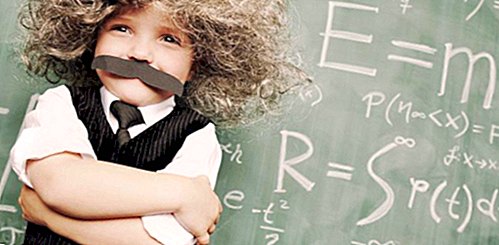Educate super clever kids? That's how it works (and not so)

Chinese courses, chess clubs and bilingual kindergartens ... there are plenty of offers for brilliant superkids that promise a much more brilliant career in brochures printed on glossy paper. The problem with that: Most little Einsteins are not so keen on being a full member of the sublime educational elite at age 3. Not even Einstein was up for it. He was a little rebel at school and had nothing left for learning drills and constraints.
Two women scientists know how to educate geniuses
In her guide: "Becoming Brilliant: What Science Tells Us About Raising Successful Children " What scientists know about raising successful children), two women scientists have much better ideas than chess and Co., how best to promote the intelligence of their own offspring. The two women are less concerned with school and professional success in the classical sense, but rather with the ability to think critically, creatively, not just in themselves and sometimes around the corner. Although we all know that not every one of us will become a little Einstein, according to Roberta Michink Golinkoff and Kathy Hirsh-Pasek, parents can easily promote the intelligence of their children, so that they become differentiated and independent thinking big people. And all without pressure. The secret formula of the two Americans: the six Cs as Superskills. In an interview with the National Public Radio, they tell you what Cs are and how they build on each other. So much in advance: Chinese is not one of them.
1. Collaboration
The will and the ability to get along
According to Roberta Michnick Golinkoff and Kathy Hirsh-Pasek the basis of everything. Controlling one's own impulses and not immediately releasing them with every little thing is indispensable to acquire all the other skills. How children learn this? Through role models and constructive feedback. Those who get along well with others and work together, says Hirsh-Pasek, "form a network and thus experience diversity and culture."
2. Communication
The ability to communicate
Also important: the ability to communicate. "This includes speaking, writing, reading and the important but lost gift of listening properly." Whether adults are always so exemplary in their mental absence and the view of smartphones and laptops? Oh well...
3. Content
The ability to acquire knowledge
Children who have a good network of communication partners and have learned to communicate well, almost fill their heads with knowledge. Most important prerequisite: People who take the trouble to really deal with children, to recognize their areas of interest and not just "is just so" to say. Even if the question is, "How are ducks built that can swim without swimming".
4. Critical Thinking
The ability to critically question
With all the knowledge in mind, critical thinking begins. Because sometimes information just does not really fit together. Why is mom and dad driving a car, even though it's destroying the environment? Why does the pastor say that one sees oneself in heaven again, even though the eyes die? Inconvenient questions and still you should answer it. How else can parents promote critical thinking? "When you see a homeless person, ask your child," How does it feel for him to have no home? "Taking another angle helps to understand that things are not always what they seem to be help to think more critically. "
5. Creative Innovation
The creativity to find new ways
Also the C number 5 builds on the other Cs. Because only those who can think critically and in many different ways and know a lot can find new ways. What helps? An environment that cares about children's ideas and discusses them on equal terms.
6: Confidence
trust
Last but not least: trust in yourself and the world. Because only with confidence will clever children become wise adults who are willing to take risks to go their own way. And only those who get up rather than fall will ultimately succeed in what they do. How to teach children this? Again, by living it out. In general, find the two women, you should always ask yourself again and again, how far you are even in the six C-skills. "There is nothing wrong with asking us as parents, in which of these points we still want to grow." They say truth, that's the way it is.

"Becoming Brilliant: What Science Tells Us About Raising Successful Children " A great book with interesting food for thought. We find: Both thumbs up. Because with many smart children, the world can only get better. Too bad that the book is not yet in German. Although a little English refresher is not bad either. In the spirit of Content-Cs. Can never hurt.










